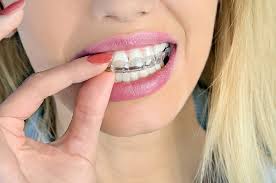
Teeth clenching (bruxizm)
Bruxism is the grinding, gnashing, or clenching of teeth together . Many people do it in during daytime and many do it during their sleep.
It’s important to understand the bad effects of bruxism and how it can affect your dental health. Around 8% of the population are Bruxers. The condition can range in severity from infrequent clenching to outright mashing . About 10% of bruxers suffer there’s no real cure, there are ways of preventing teeth grinding. On average person’s tooth enamel erodes by 0.3 millimeters every decade, teeth grinders can wear away 0.2 millimeters in 2 years.
Teeth clenching can have an ill effect on the jaw muscles. They become sore and tired from excessive use, and disorders may arise from long-term clenching. Teeth and jaw clinchers often develop chronic headaches because of the jaw muscle tension .
Clenching is most often associated with stress, but it can due to chewing on other things, including chewing gum, pencils, or pens can be as a complication of a handful of medications, such as certain anti-anxiety pills.
Teeth grinding is cumulative effect It’s not one day of clenching gnashing , it’s the years of such behavior resulting in teeth wear down , sparking serious dental treatment.
Teeth grinding occurs mostly during sleep due to sleep apnea in which sleep is disrupted by pauses(total stopping) in breathing or shallow breaths. The pauses can last more than a minute, and they’re usually followed by a choking . Many people don’t realize they have the problem. Some of the side effects can include Teeth loosening , Teeth fracture, Enamel wear away, Jaw ache, Teeth pain, Joint disorders.
Treatment can be treating the underlying cause, behavior therapies and mouth guards or mouth splints.
The underlying cause such as stress and anxiety, that may be causing you to grind your teeth.
Behavior therapies stress reduction. Listening to music (classic), taking a warm bath and exercising will help you relax .
Yoga.
Massage.
Deep breathing.
Avoid Caffeine in the evening. Don’t drink coffee or tea at night ,cut down alcohol , smoking during the evening.
Avoid recreational drugs: Such as cocaine
Muscles relaxation exercises: ask your dentist for that.
Avoid chewing other than food items such as pen or pencil.
Practice good sleep habits. By putting headset to listen to music during sleeping.
Talk to your sleep partner. To see results of applying the above measures
Regular dental visits to your dentist can spot signs of bruxism in your mouth.
Mouth guards and mouth splints. If you grind teeth while asleep, you may have to wear a mouth guard or mouth splint at night, a physical barrier between your upper and lower teeth to protect from further damage. They do reduce grinding noises you make at night
They’re usually made out of bendy rubber or plastic and can be made by your dentist to fit your mouth.
A mouth splint is made from harder plastic and fits precisely over your upper or lower teeth
Mouth splints are no more effective than mouth guards in reducing the symptoms of bruxism. They tend to last for years, whereas mouth guards usually last for less than a year.
Breaking the habit .Habit-reversal techniques are designed to stop teeth grinding .If you grind your teeth while awake, it is useful to record how often you grind your teeth each day. You can then work out when you’re more likely to do it and why? e.g. when you’re concentrating or stressed
Being aware of the habit will make it easier to break the habit, train yourself to relax your jaw and keep them apart when you feel yourself grinding or clenching.
Medication Such as muscle relaxants and non steroidal anti-inflammatory drugs before going to sleep.
Leave a reply →

Leave a reply